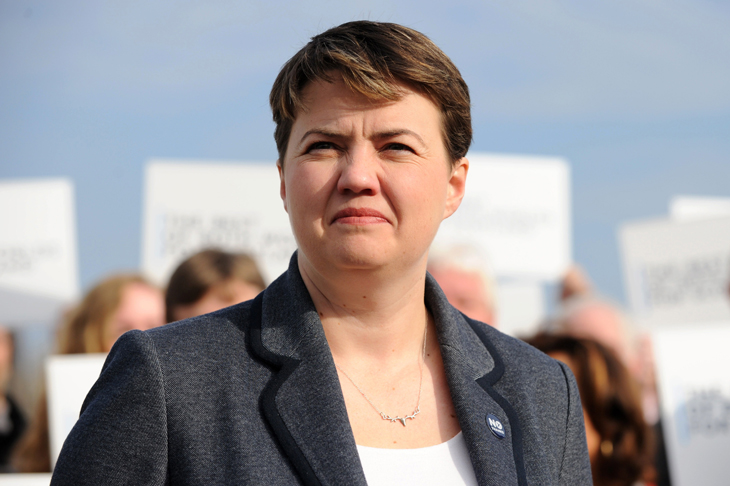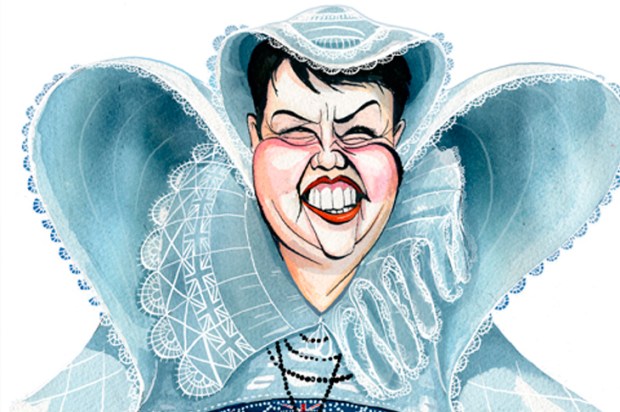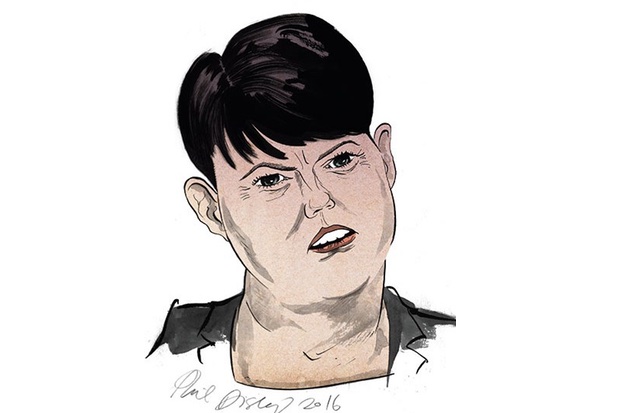At last, there is light in the north. The long Scottish Tory winter has finally ended, giving way to the freshest spring imaginable. Just ten days ago, leading Scottish Tories believed they might win half a dozen seats at the general election. Even on election night they struggled to accept the reality of what was happening. ‘Ayr? Really?’ But they did win Ayr. And Stirling. And Angus. And Gordon. And Moray.
This was emphatically not Theresa May’s victory. It was Ruth Davidson’s. Now, in the aftermath of this Ruthquake, a question arises: if Ruth can save the Scottish Tories, couldn’t she do something similar south of the border? Every newspaper has carried a version of this fantasy. It shows once again that there’s nothing so powerful as wishful thinking.
Although Jeremy Corbyn helped Labour to a better-than-expected result, this was not a contest between right and left in Scotland. It was, once again, nationalist vs unionist. ‘Politics is different here,’ says one senior Tory, ‘so we had to run our own campaign.’ Much to the fury of May’s advisors, the Scottish Tories dumped the UK party message. Would-be MPs were branded ‘Ruth Davidson’s candidate’, not Theresa May’s, and by the end of the election Scottish Tories feared that May’s less than strong and stable campaign risked costing the party seats in Scotland.
Tories pining for Davidson to leave Edinburgh for London forget that she has a considerable job still to do. Project Ruth is only half-complete; it ends, in her imagination at least, with her becoming first minister after the 2021 Holyrood elections. That was once such a laughably unlikely goal that even she did not think it possible; now it is merely improbable. Nevertheless, her elevated ambition shows the seriousness of the Tory revival in Scotland.
This election was a mighty victory for unionism — the three pro-UK parties won 61 per cent of the vote — and a disaster for Nicola Sturgeon and the SNP. Even so, canny unionists appreciate it was not the final word on the national question. Support for independence remains above the 40 per cent needed to keep the issue alive.
There is no prospect of a second referendum before 2021, but the next Holyrood election may yet be fought as a proxy vote on the issue. If — a hefty if — a pro-independence majority is returned, precedent suggests it would be damnably hard for the UK government to block another referendum. Thwarting that remains Davidson’s biggest task and helps explain why, even if she wanted to flit south, it would be irresponsible for her to do so. Few politicians are truly indispensable but it is difficult to imagine how the Scottish Tories could replace Davidson. Doing so would put the party’s revival at risk.
There remains a great deal of work to do before the Tories are seen as a credible party of government in Edinburgh. Davidson’s allies concede her strengths lie in campaigning more than in policy development. Their task is to develop a policy infrastructure on schools, health and the economy that will make a vote for the Tories something more than a constitutional protest.
Davidson’s opposition to independence was enough to deliver the Scottish Tories’ best vote share since 1979. But it was not an endorsement, as Davidson knows, of Conservatism. Her 13 MPs are Scots who happen to be Tories, not Tories who happen to be in Scotland. ‘As a party, we have to reflect our Scottishness,’ says one of her closest allies. That does not mean the Scottish Tories will break away, but it does mean their unionism must be infused with a small-n nationalism.
When the Tories last dominated Scottish politics they did so as nationalist-unionists. In 1950, Winston Churchill avowed that he could ‘never accept the view that Scotland should be forced into the serfdom of socialism as a result of a vote in the House of Commons’.
Devolution, however, means a political career can be forged outside London. This should be understood as a feature, not a bug. The Tory gains in this campaign were the culmination of five years’ work, but Davidson has always known that rescuing Conservatism — and unionism — is a ten-year project. That means it is only half-completed. Project Ruth has a way to go yet and the work must be done in Edinburgh, not London.
Got something to add? Join the discussion and comment below.
Get 10 issues for just $10
Subscribe to The Spectator Australia today for the next 10 magazine issues, plus full online access, for just $10.
You might disagree with half of it, but you’ll enjoy reading all of it. Try your first month for free, then just $2 a week for the remainder of your first year.















Comments
Don't miss out
Join the conversation with other Spectator Australia readers. Subscribe to leave a comment.
SUBSCRIBEAlready a subscriber? Log in